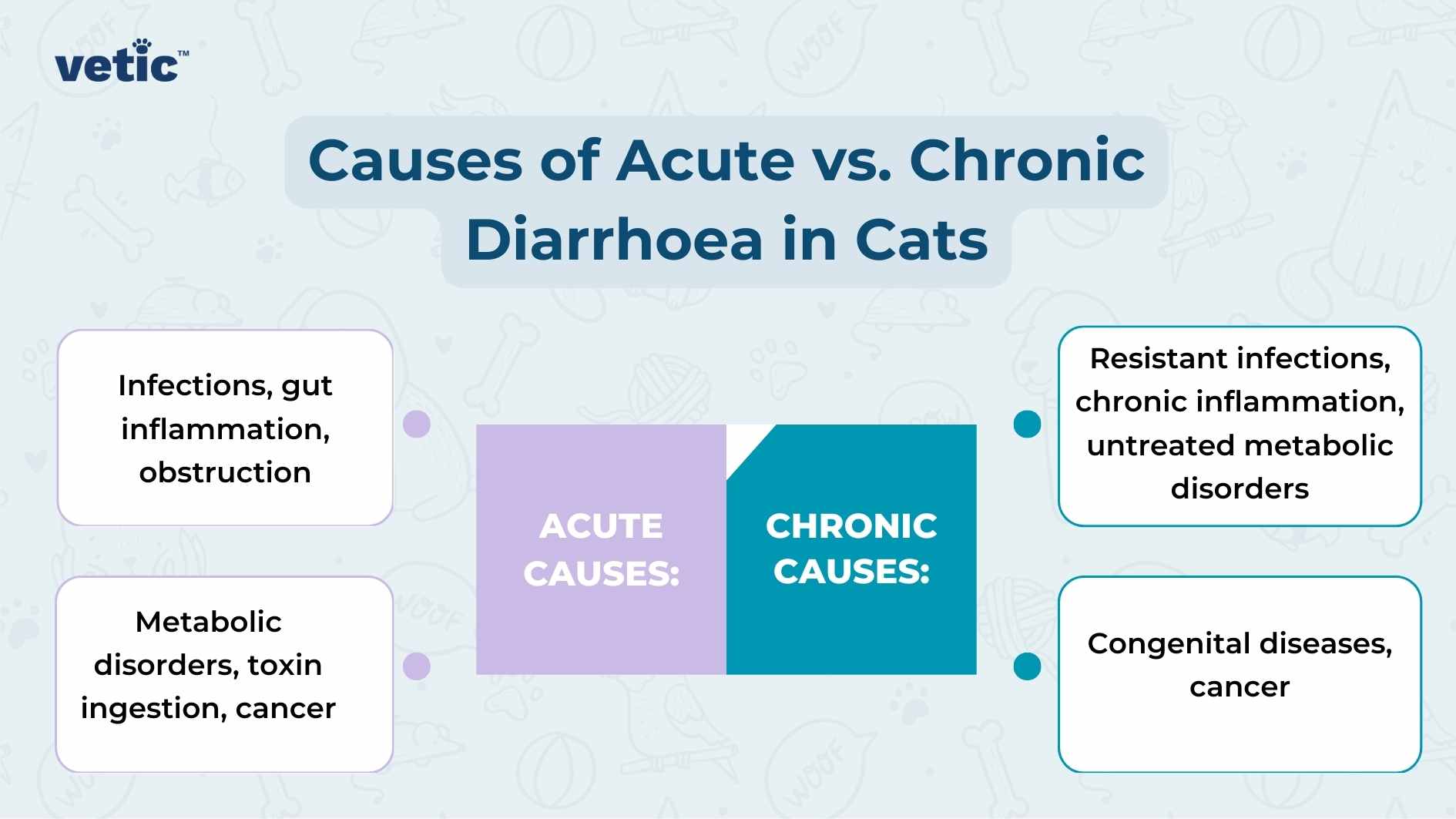Are you noticing formless stools that can’t easily be scooped up from the litter? Is it difficult to say from the litter clumps whether your cat has peed or pooped? These are all signs of diarrhoea in cats.
Diarrhoea in cats is a broad term that covers any loose or shapeless stools that your cat makes inside or outside the litter box. It can happen when the undigested or semi-digested food moves rapidly through the gut without releasing enough nutrients and water.
Diarrhoea in cats can be dangerous since it causes loss of fluids, electrolytes and essential nutrients from your cat’s body.
If your cat has diarrhoea, consult a senior veterinarian near you immediately.
Why Visit the Veterinarian for Cat Diarrhoea?
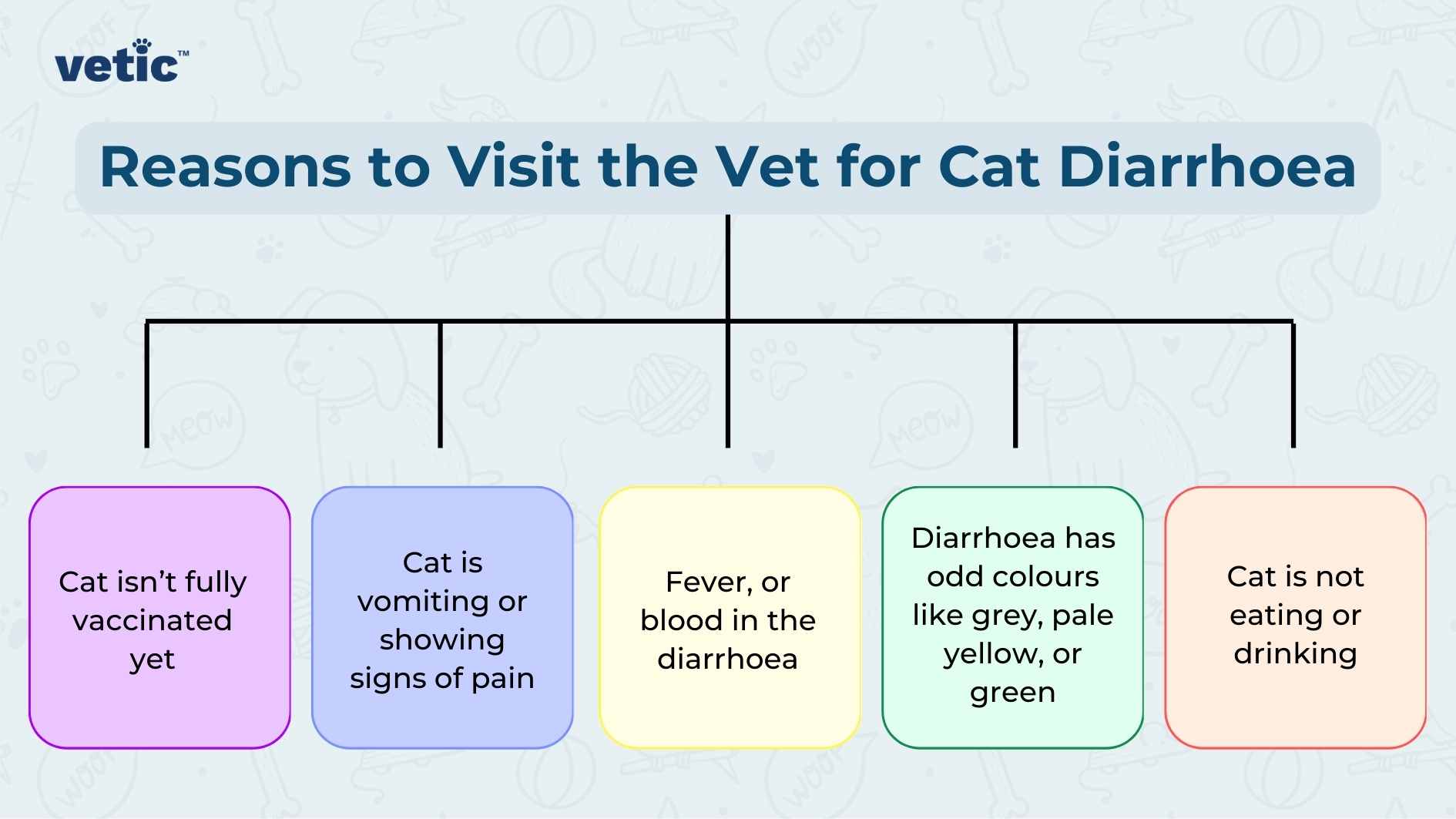
Diarrhoea is not a disease in itself. It may be a sign of several other infections or systemic disorders your cat may have. Symptomatic treatments for diarrhoea in cats can solve the problem momentarily, but if your cat has another serious health issue, it is bound to recur.
It is very important to seek veterinary advice, in person, if your cat has diarrhoea.
Here are the reasons why you should visit the vet if your cat has diarrhoea –
- Your cat isn’t fully vaccinated yet
- Your cat is old or too young
- Your cat is vomiting as well
- Your cat is showing signs of pain
- The cat isn’t eating or drinking
- They have a fever
- The diarrhoea has blood in it
- The diarrhoea is grey, pale yellow, has worms and/or green
Each of these signs/conditions indicates a deeper issue that is plaguing your cat’s health. Diarrhoea in cats should never be taken lightly no matter how well you have treated diarrhoea in cats with at-home remedies before this.
What is Chronic vs. Acute Diarrhoea in Cats?
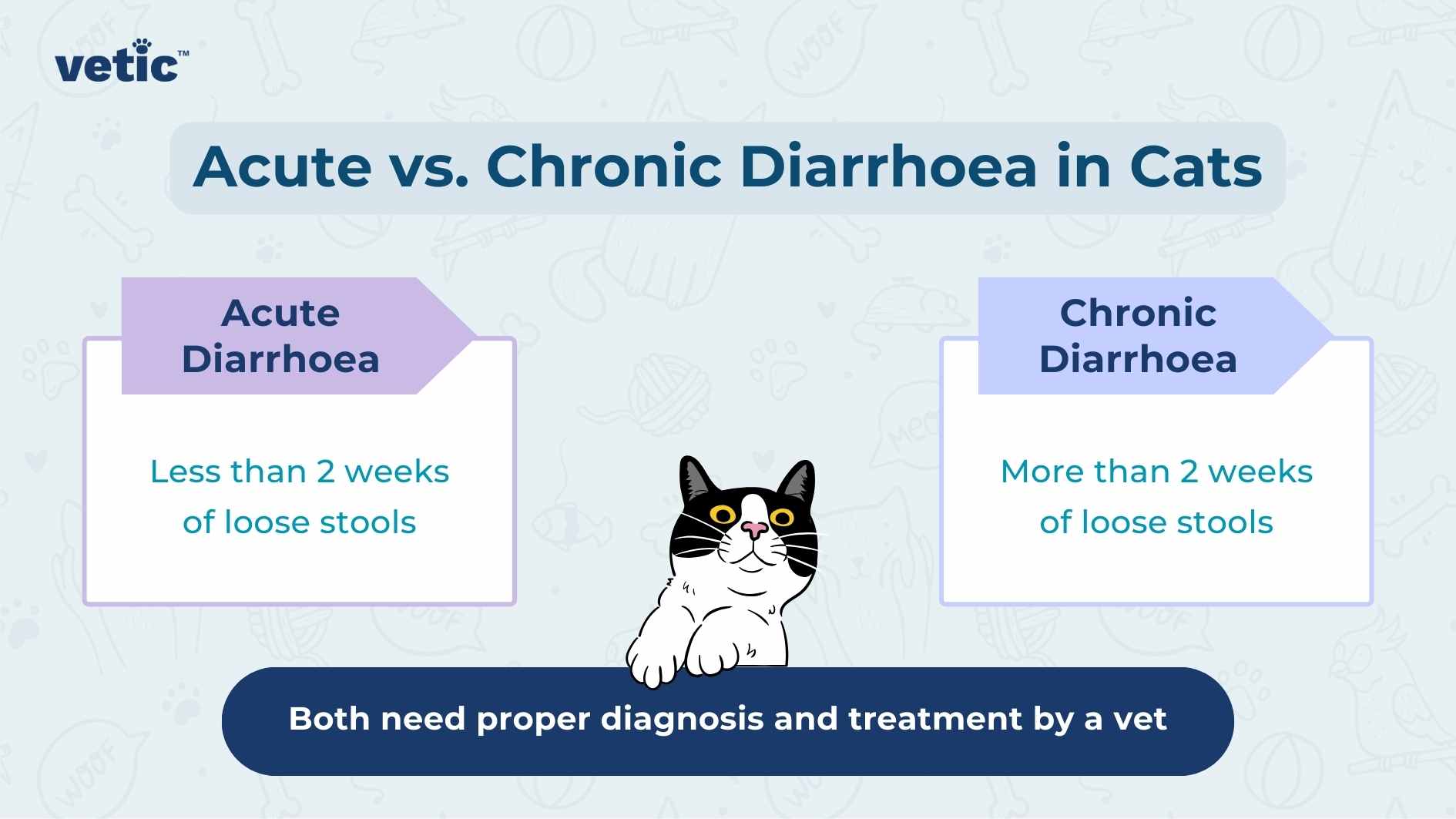
Diarrhoea in cats can be acute or chronic.
Acute Diarrhoea in Cats: A case of acute diarrhoea will be defined by loose stools in your cat for less than 2 weeks.
Chronic Diarrhoea in Cats: A case of chronic diarrhoea in cats is defined by the presence of loose stools for longer than 2 weeks.
Both the cases are worrisome depending on the nature and cause of the episode. Your veterinarian should do a complete physical checkup, blood tests and full stool examination to determine the cause before beginning the treatment to treat the underlying cause.
What Causes Diarrhoea in Cats?
The causes of diarrhoea in cats can be divided into two categories depending on whether they have acute diarrhoea or chronic diarrhoea.
Causes of acute diarrhoea in cats
There are 6 main causes of acute diarrhoea in cats –
- Infections (bacterial, protozoal, parasitic, viral and fungal)
- Inflammation inside the gut
- Metabolic disorders (hyperthyroidism or diabetes)
- Obstruction
- Toxin ingestion
- Cancer
The treatment plan will depend upon the root cause of diarrhoea in your cat.
Causes of chronic diarrhoea in cats
There are 5 main causes of chronic diarrhoea in cats –
- Resistant or recurring infections
- Untreated metabolic disorders
- Chronic inflammatory diseases
- Cancer
- Congenital diseases/disorders (present from birth)
Chronic diarrhoea in cats can be life-threatening due to the nutrient and electrolyte imbalance they cause in cats alongside rapid dehydration. Chronic diarrhoea typically requires a multi-faceted treatment plan that caters to the multiple factors contributing to your cat’s chronic diarrhoea.
How are the Causes of Diarrhoea in Cats Diagnosed?
Always carry a fresh stool sample that is not clumped in litter while visiting the veterinarian.
Faecal or stool sample testing is a must for the diagnosis of the real cause of diarrhoea in cats, but running blood and biochemistry tests will help you and your veterinarian find out if there are signs of infections, metabolic disorders or toxin ingestion in your cat’s system.
Sometimes, abdominal ultrasound or X-rays are also necessary to diagnose whether a cat has an obstruction, internal inflammation or cancer that is causing the diarrhoea.
Treatment for Diarrhoea in Cats
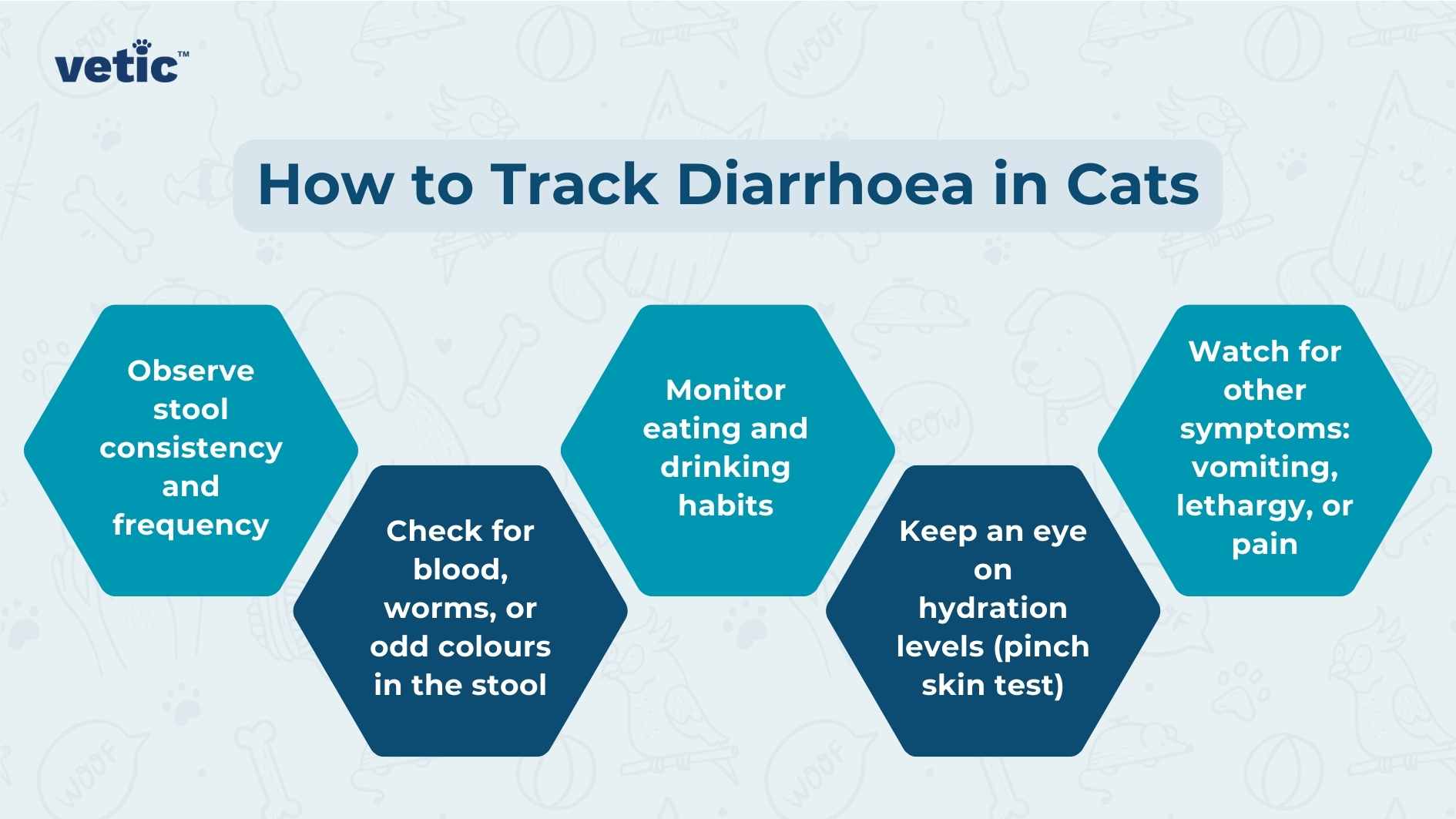
The treatment will depend upon the cause(s) of diarrhoea in cats. For some acute cases that involve sudden food change or overeating, the veterinarian might prescribe easy-to-digest food, probiotics and additional fibres.
Other, more serious causes require careful evaluation. Not all causes of diarrhoea in cats respond to common antibiotics, so we always suggest pet parents to refrain from self-prescribing medications to cats. More importantly, many anti-diarrhoeal agents used in humans can be toxic in cats. So consult the vet before medicating your cat.
Severe diarrhoea for longer periods of time do require intensive care and fluid therapy to correct dehydration, nutrient and electrolyte loss in cats.
Note: Yogurt and curd are good sources of probiotics FOR HUMANS. Do not give them to your cat when they have a stomach upset. Yogurt has some lactose and most adult cats cannot digest lactose and it might worsen their diarrhoea.
My Cat Has Diarrhoea. What Should I Do?
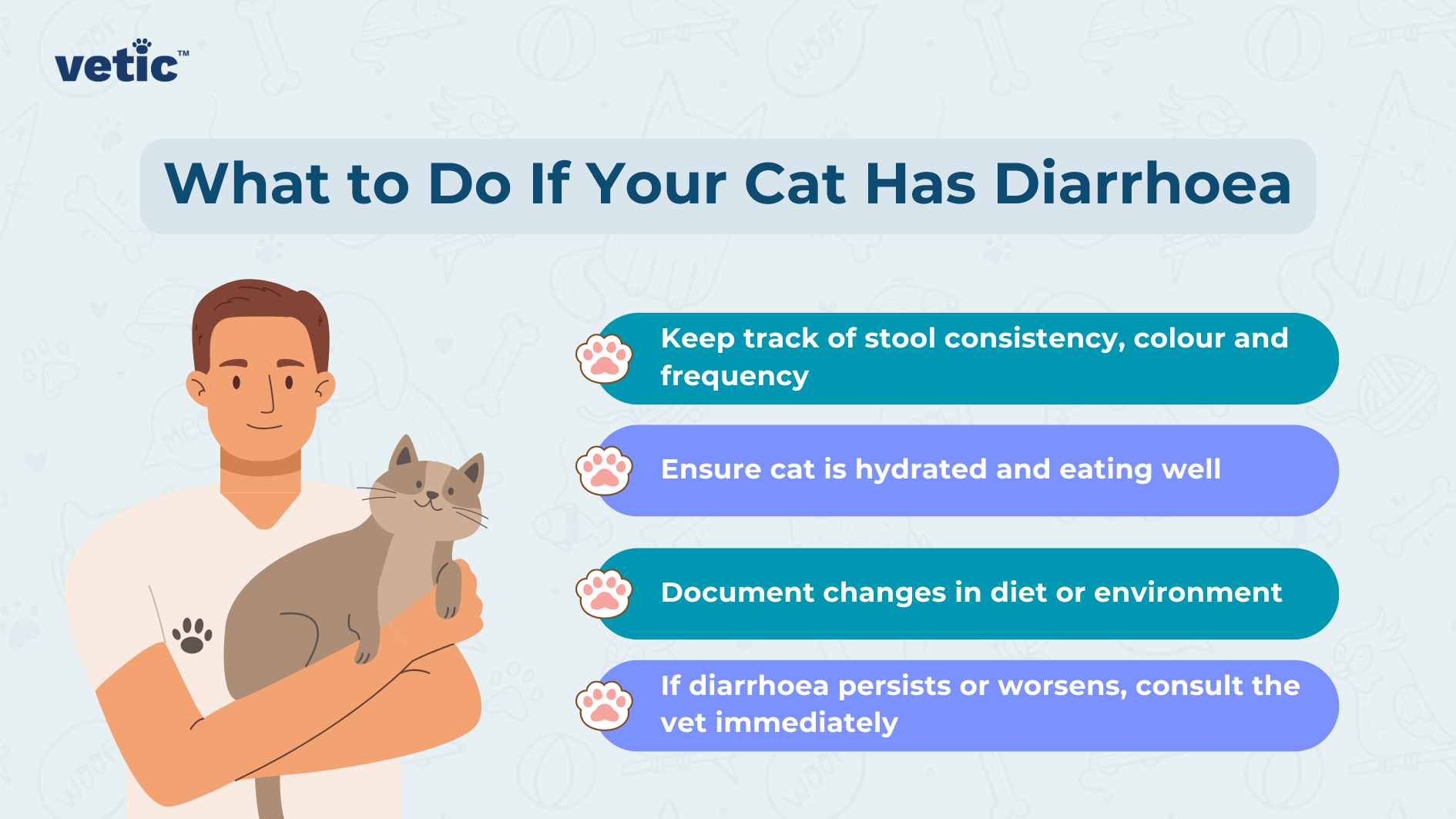
If your cat has diarrhoea, monitoring them carefully is crucial to ensure they don’t become severely dehydrated or face other complications. Here’s how you can keep track of your cat’s condition and know when to seek veterinary help:
- Observe Stool Consistency and Frequency
Keep an eye on the litter box for changes in the consistency of your cat’s stools. If they’re loose, watery, or contain mucus, it’s a sign of diarrhoea. Monitor how often they are going, as frequent diarrhoea can lead to dehydration.
- Check for Blood or Odd Colours
Blood, unusual colours like light yellow, green, or grey, or worms in the stool indicate a more serious issue that requires immediate vet attention.
- Monitor Eating and Drinking Habits
Cats with diarrhoea may lose their appetite or stop drinking, which can worsen dehydration. Ensure they are eating and drinking enough and provide access to fresh water at all times.
- Track Hydration
Dehydration is a major concern with diarrhoea. You can check your cat’s hydration levels by gently pinching the skin at the back of their neck. If it doesn’t return to its normal position quickly, your cat might be dehydrated and will need fluids, potentially from a veterinarian.
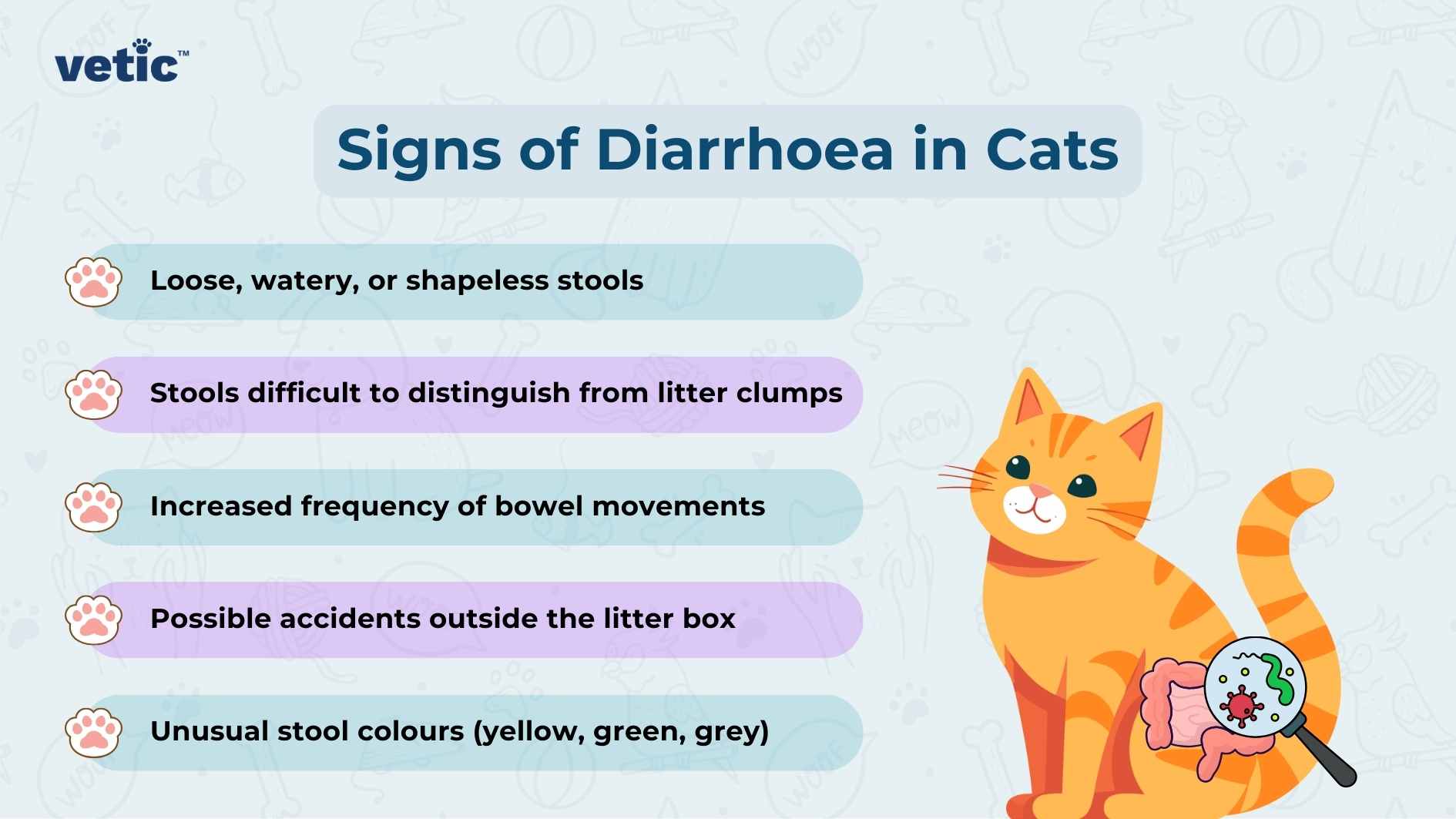
- Watch for Other Symptoms
Monitor for additional symptoms such as vomiting, lethargy, or signs of abdominal pain. If these occur alongside diarrhoea, a vet visit is needed urgently.
- Measure Duration of Diarrhoea in Your Cat
Acute diarrhoea (less than 2 weeks) may resolve with dietary changes, but chronic diarrhoea (more than 2 weeks) needs prompt veterinary diagnosis. Keep track of how long the diarrhoea persists.
- Document Any Changes in Diet or Environment
Sudden changes in food, stress, or other environmental factors can cause diarrhoea. Make a note of any recent changes that might help your vet diagnose the issue.
If diarrhoea persists for more than a day or is accompanied by any of the above red flags, visit a vet promptly for further diagnosis and treatment.

